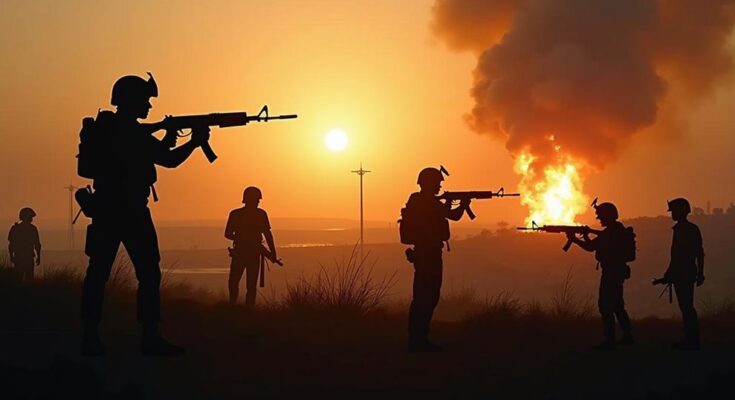Israel has vowed to respond after Iran launched ballistic missiles targeting military sites, with escalating violence prompting fears of further conflict in the Middle East. As Israel attacks Lebanon, civilian deaths are rising significantly, raising international concern and calls for U.S. intervention.
Following Iran’s recent launch of numerous ballistic missiles targeting critical military and security sites in Israel, Prime Minister Benjamin Netanyahu has announced that Israel will retaliate. Ryan Costello, a policy director at the National Iranian American Council (NIAC), emphasized the precarious state of the Middle East, stating, “It’s a very dangerous dynamic where each side is trying to set new red lines or escalate past other red lines, and we don’t know, unfortunately, how devastating this could get” – Al Jazeera. Costello expressed skepticism regarding the notion that heightened violence would lead to de-escalation and reduce future attacks, referencing a report from Axios indicating that the Biden administration supports Israel’s strategy of “de-escalation through escalation” in relation to Hezbollah. He remarked on the cyclical nature of retaliation, stating, “An eye for an eye makes the whole world go blind. And I think that’s going to be the case if the parties continue to go down that road of trying to escalate.” Costello further attributed Iran’s aggressive stance to what he termed President Biden’s “blank check” to Netanyahu, allowing continued military actions in Gaza and Lebanon. The Israeli military has issued evacuation orders for residents near Hezbollah centers in southern Beirut as attacks on Lebanon increase, resulting in approximately 55 fatalities in a single day, with total deaths over the past year nearing 2,000. This recent surge in violence is notably higher than the death toll during the 2006 war with Hezbollah, which claimed 1,200 lives over 33 days. In light of these developments, the United States House Speaker, Mike Johnson, urged for a decisive American response to Iran, condemning its actions as unjustified and asserting the necessity of a strong policy against Iranian aggression. Johnson stated, “The strategy of appeasement has failed, and a policy of interdiction is not enough,” advocating for a return to a vigorous pressure campaign against Iran. As hostilities escalate across the region, the international community remains watchful regarding the implications of these attacks and the potential for further confrontations.
The recent conflict between Israel and Iran, which has escalated dramatically with missile strikes and retaliatory military actions, underscores a long-standing tension in the Middle East. Iran’s missile attack on Israel marks a significant shift in hostilities, as both nations continue to assert dominance and respond militarily. The backdrop includes concerns surrounding Hezbollah in Lebanon, the ongoing war in Gaza, and the broader geopolitical strategy of the United States in the region, which has been characterized as inconsistent and at times supportive of aggressive Israeli actions. As civilian casualties rise in Lebanon and Israel, these conflicts heighten the humanitarian crisis and complicate diplomatic efforts for peace and stability in the area.
In summary, Iran’s missile attacks on Israel have triggered a cycle of retaliatory threats and military action, with Netanyahu committed to a response. Ryan Costello of NIAC warns against the escalation of conflict, reflecting on the increasing number of civilian casualties as Israel intensifies its operations in Lebanon. With calls for stronger U.S. intervention and criticism of the Biden administration’s policies, the situation embodies a perilous dynamic that could lead to further instability in the region. The international community is closely monitoring developments as escalation seems likely in the coming days.
Original Source: www.aljazeera.com




